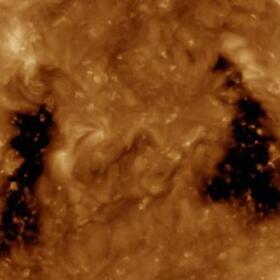
Western Slope Skies
Published every other Friday morning after 8:10 am broadcast.
A bi-weekly short feature on astronomy, produced by members of the Black Canyon Astronomical Society.
Link for podcast apps:
https://www.kvnf.org/podcast/western-slope-skies/rss.xml
Latest Episodes
-
How did life originate? Did it form on Earth or elsewhere in the solar system and was it seeded on Earth by impact of an asteroid? Will life eventually be wiped out by an asteroid? While we may never know the answers to these questions, scientists are attempting to study as much as possible about the origins of life and the possibilities of future asteroid collisions with the Earth.
-
On a clear night if you look in the sky towards true north, you’ll notice a star that seems to never change direction. If you’re able to find this star, it is called Polaris.
-
An article in the international journal Nature Cities by Lvlv Wang and co-authors document the effect of light pollution on the growing season in 428 Northern Hemisphere cities between 2014 and 2022. They note that the typical growing season is controlled by heat and light. While cities are getting warmer due to climate change, they are also getting brighter due to excessive lighting. After controlling for the warming effect, they found that the excessive light was extending the growing season.
-
The unappreciated dung, or scarab beetle, an insect that evolved about 130 million years ago, must accomplish its nocturnal task under increasingly difficult conditions; chief among them, light pollution.
-
Awe, as researchers Maria Monroy and Dacher Keltner explain, is a transformative emotion. It soothes your nervous system, quiets self-doubt, fosters kindness, builds connection, and gives life meaning. Under a starry sky, awe feels like the universe reaching out, reminding you that you’re part of something greater, never truly isolated.
-
Have you noticed fewer insects around your porch light or fewer splattered bugs on your windshield? You're not alone. Scientists are calling this a new crisis—the "insect apocalypse"—and artificial light at night is a major cause.
-
We know that waterfowl like geese migrate at night, but did you know that songbirds do too? Beneath Western Colorado’s vast, star-strewn skies, migratory birds like Warbler’s, and Swainson’s Thrush embark on a breathtaking odyssey, their wings slicing through the night during peak migrations in May and September, from 10 p.m. to 2 a.m.
-
The Black Canyon of the Gunnison earned its name from the limited light that reaches its deepest corners during the day. At night, little artificial light, too, intrudes upon its skies, making the canyon a prime location for viewing the celestial wonders above. The annual astronomy festival AstroFest returns again this month to celebrate such sights as well as the Western Slope's precious access to these natural skies.
-
When is a hole not really a hole…when it is a solar coronal hole!
-
The sun is shining, the sand feels warm beneath your toes, and you're watching the waves crash over one another. They rise to where you are standing, rushing over your feet and then fall back down. A few hours later, you come back to the same spot- and this time, the waves fall short of reaching you. You pause and start to wonder why... and then, you look up at the sky and spot the moon. There's your answer.







